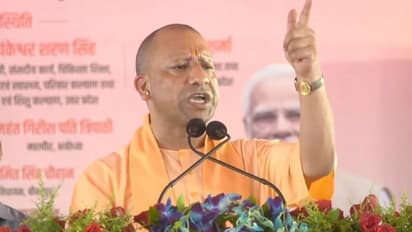Uttar Pradesh: Yogi govt to launch third phase of statewide disease control campaign (WATCH)

Synopsis
The Yogi Adityanath-led government will launch the third phase of its Communicable Disease Control Campaign on October 1, targeting vector-borne diseases and brain fever. The Dastak Abhiyan, starting October 11, will involve intensified fogging, public awareness, and home visits by health workers to curb disease spread.
The Yogi Adityanath-led government will kick off the third phase of its Communicable Disease Control Campaign on October 1. This initiative, running through October 31, aims to combat vector-borne and communicable diseases, including brain fever. The Dastak Abhiyan, an extension of the campaign, will begin on October 11 and continue until October 31.
Under Chief Minister Yogi Adityanath’s leadership, the campaign will see collaboration between 11 departments, with the Health Department serving as the lead agency. The initiative will focus on intensifying fogging, vector control, and public awareness efforts in high-risk areas across Uttar Pradesh.
The Chief Secretary, Manoj Kumar Singh, has instructed Municipal Commissioners, Jal Sansthan General Managers, and Nagar Palika Parishad Executive Officers to execute a detailed action plan for the campaign. Sensitization meetings are scheduled for all Municipal Corporations, Municipal Councils, and Nagar Panchayats to ensure smooth coordination.
Urban bodies are required to submit microplans, outlining body-wise and ward-wise activities, to the Chief Medical Officer by September 29. The campaign will address vector-borne diseases, waterborne illnesses, and brain fever, with a focus on cleanliness and public health.
The Dastak Abhiyan will involve health workers visiting homes to promote health and cleanliness. They will collect data on symptoms of brain fever and other illnesses, which will be logged on the e-Kavach portal. The campaign will also include identifying and reporting mosquito breeding sites.
The Health Department will coordinate with departments such as Medical and Health, Urban Development, Rural Development, Child Development, and others. The World Health Organization (WHO) and UNICEF will oversee the campaign’s progress.
Stay updated with the Breaking News Today and Latest News from across India and around the world. Get real-time updates, in-depth analysis, and comprehensive coverage of India News, World News, Indian Defence News, Kerala News, and Karnataka News. From politics to current affairs, follow every major story as it unfolds. Get real-time updates from IMD on major cities weather forecasts, including Rain alerts, Cyclone warnings, and temperature trends. Download the Asianet News Official App from the Android Play Store and iPhone App Store for accurate and timely news updates anytime, anywhere.